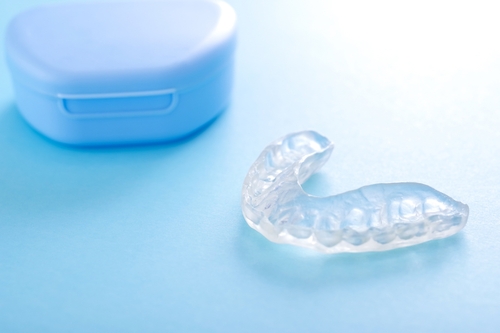Failing to get a good night’s sleep or waking up with a headache or other discomfort can be tiring and present an ongoing challenge throughout your day. Experiencing jaw pain during the day, after meals, or spontaneously is not something you need to ‘just live with.’ You may begin to notice dental issues occurring more frequently and your jaw starting to ache at times. If so, you may be experiencing bruxism.
Bruxism, the grinding and/or clenching of teeth, is a rather common issue today for many individuals. However, you don’t have to live with it and simply accept that it occurs. There are specific actions you can take, starting with wearing a beneficial nightguard provided by your dentist.
What Exactly is Bruxism and Why Do I Grind My Teeth at Night?
Bruxism is the intense clenching and/or grinding of teeth, often done unconsciously at night as you sleep or during the day without noticing. When this ongoing force is exerted, it overworks the muscles in the jaw and can cause a number of symptoms that can plague you upon awakening as well as later on in the day. There are also signs of bruxism that you may not notice, but your dentist does.
Symptoms include:
- An unexplainable headache first thing in the morning
- A stiff, sore, or painful jaw
- A jaw clicking or popping sound when you talk, eat, or yawn
- Sudden earaches
- Odd neck pain
- Continual sleep interruptions
Signs of bruxism include:
- Excessive tooth wear
- Damage to dental restorations (e.g. fillings, crowns, veneers)
- Gum recession
- Notching of the teeth along the gumline
- Changes around the teeth that are seen on x-rays
Bruxism can result for a number of reasons, including aging, stress, and medical issues. It can also occur when you have dental problems, such as crooked teeth or an abnormal bite. The good news, however, is that it’s treatable. Your dentist can help you find a way to manage it while you address the underlying issues.
If bruxism is left untreated, however, it can lead to fractures, root canals, shortening of the teeth, and other dental issues. Fixing the effects of bruxism can require you to undergo restorative measures such as crowns or implants in order to improve your oral health.
Do Nightguards Really Work for Bruxism?
To manage your bruxism, your dentist can provide you with a nightguard to wear when you sleep. It sits over the top of your teeth, much like mouth trays. While they do take a short while to get used to wearing, soon they become an easy part of your nightly routine.
So, how exactly do nightguards work when it comes to bruxism?
A nightguard works by forming a protective layer or barrier between the upper and lower teeth. This barrier prevents the two from meeting when you unknowingly grind your teeth as you sleep. Therefore, your nightguard helps to limit tooth enamel abrasion, protecting your teeth from excessive wear.
A nightguard helps to provide protection to your teeth but is not a cure. Wearing one will lessen the forces you share with your teeth, gums, and bone, and may help to alleviate the unexplainable morning headaches, jaw, neck, and teeth discomfort, and sleep disruptions that leave you groggy the next day. A nightguard will not stop you completely from trying to grind and clench your teeth as you sleep.
To help alleviate the actual bruxism, you will need to:
- Find ways to release stress in your life
- Discuss any medical conditions with your doctor
- Work with your dentist to discover ways to correct crooked teeth or an abnormal bite
Do People Grind and Clench Their Teeth During the Day?
It is also important to be aware of daytime bruxism. This phenomenon is almost as common as nighttime bruxism, but can lead to the same damaging effects. Grinding or clenching your teeth during the day often occurs while working, concentrating, and focusing or when you are stressed, anxious, frustrated, or upset.
Of course, many of our daily routines prevent us from wearing a nightguard during the day, so there are a couple options. First, if you have certain tasks that don’t require you to speak, wearing the nightguard could be useful. These tasks can include lifting weights, doing household chores, and being on the computer. Also, the dentists at Smile Hilliard may also recommend a removable day-guard which is much smaller and thinner than a traditional nightguard. It works as a reminder not to put your teeth together while you are awake and conscious.
How to Care for Your Nightguard
If your dentist determines that you experience bruxism at night and provides a nightguard for you to wear, you need to know how to care for it so it benefits you.
Follow these tips:
- Brush and floss before inserting your nightguard.
- Each morning, remove and clean your nightguard using a gentle soap and warm water. Rinse thoroughly.
- When the nightguard dries after cleaning, place it in a protective container. Place this container in a safe place away from direct heat and sunlight.
- Regularly inspect the nightguard for any signs of cracks, holes, or other damage. If you find something, call your dentist’s office for guidance.
- Bring your nightguard in its protective container to each dental appointment so your dentist can inspect it and make sure the fit and shape are still beneficial to you.
- Follow all instructions provided by your dentist. If you have any questions after a few days or weeks, don’t hesitate to call.
Nightguards can provide you with a solution for maintaining your oral health and keeping discomfort and excessive dental needs at bay. Caring for them is simple and easy, and you can use them to help you manage your bruxism over the short or long term.
Contact Smile Hilliard to Learn More and To Find Out if a Nightguard Will Work for You
To learn more about bruxism and nightguards and find out how you can benefit, contact the team at Smile Hilliard today. We value our patients and work diligently to find the right dental solution for you and your family’s needs. Call or submit our online contact form today.






